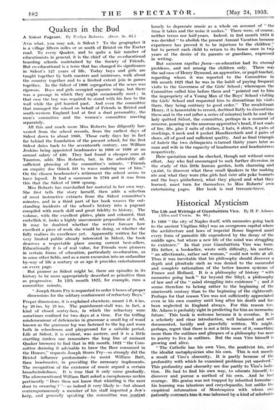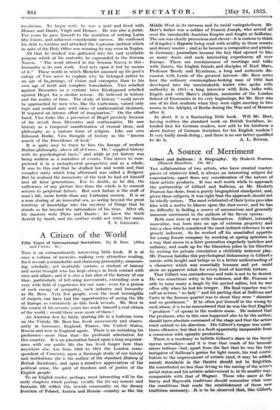Historical Mysticism
The Life and Writings of Giambattista Vico. By H. P. Adams. (Allen and Unwin. 8s. 6d.)
Ix 1668 " the city of Naples itself, with memories going back to the ancient Virgilian Sibyl was an overgrown capital where the architecture and laws of imperial Rome lingered amid every form of parasitic life engendered by the decay of the middle ages, but where a new life of the mind was struggling to existence." In that year Giambattista Vico was born. His father, a bookseller, wrote with difficulty,- his mother, " an affectionate, rather sad woman," could not write at all. Thus it was inevitable that his philosophy should discover a depth and plenitnde such as 'was denied to the successful and complete rationalism of the better known systems of France and Holland. It is a philosophy of history " with memories going back ". far beyond the' Sibyl, a philosophy of law and of the " mind struggling into existence " ; and it seems therefore to belong rather to the beginning of the nineteenth century than to the beginning of the eighteenth. Perhaps for that reason Vico was not sufficiently appreciated even in his own country until long after his death and has been neglected in England always. For this reason too, Mr. Adams is probably right in predicting for hint an increasing future.- This book is welcome because it is overdue. It' is a scholarly and clear introduction, well balanced and well documented, lucidly and gracefully written. We might, perhaps, regret that there is not a little more of it,:something more than the outlines and glimpses of a philosophy too near to poetry to live in outlines. But the man Vico himself is growing and alive. '
" The Catholic has his own Vico, the positivist his, and the idealist metaphysician also his own. This is not merely a result of. Vico's obscurity. It = is partly because of the profundity with which he examined problems yet unsolved.- This profundity and obscurity are due partly to Vico's isola- tion.. He • had to find his own way, to educate himself,;- to discover and pursue a method of his own. -And he had courage. His genius was not trapped by inherited formulae : his learning was laborious and encyclopaedic, but unlike the empirical information of Montesquieu with whom one nafttraily_contraats him it_Was 'informed-by a kind of scholaitie
mysticism. To begin with, he was a poet and lived with homer and Dante, Virgil and Horace. He was also a jurist. For years he gave himself to the ambition of writing Latin like Cicero, and achieved considerable success. He confessed his debt to Grotius and attacked the Cartesian method which in spite of the Holy Office was winning its way even in Naples.
All that he studied was gathered into his vast synthetic purpose which at his maturity he expounded in the Scienza Nuova. " The word uttered in the Scienza Nuova is this : humanity is its own work. God acts upon it but by means of it." These words in which Michelet summed up his poet's eulogy of Vico serve to explain why he belonged rather to an age of beginnings, of vision and enterprise than to his own age of lucid and complete formulation. Vim) rebelled against Descartes as a century later Kierkegaard rebelled against Hegel, for a similar reason. He believed in history and the reality of time. The study of history " could never be approached by men who, like the Cartesians, valued only logic and worked only with ideas of mathematical clearness. It required • an- intense effort of imagination." - On the other hand, Vico looks like a precursor of Hegel precisely because of his revolt from Descartes and mathematics. He saw history as a temporal manifestation of eternal ideas, and philosophy as a mature form of religion. Like our own Edmund Burke, Vico thought of history as the " known
march of the Providence of God." •
It is quite easy to trace to him the lineage of modern; Italian philosophy, above all of Croce. He " supplied history with its psychological basis,"- and while as yet history was being written as a narrative of events, Vico strove to com- prehend it in a metaphysical perspective and as a whole.. It was to this end that he studied law and words and that complex unity which long afterward was called a Zeitgeist. But lie realized the immensity of the task he had set himself and all later generations.. For to doubt. as he did, the sufficiency of any picture less than the whole is to commit science to perpetual failure. But such failure is the stuff of man's life, more fertile than- any Cartesian success. It is as. a man staring at an immortal sea, as seeing beyond the great territory of knowledge into the mystery of things that he stands so- far beyond the rationalism of his time. After all, his masters were Plato and Dante : he knew the Sixth Aeneid by heart, and his mother could not write her name.
T. S. GREGORY.















































 Previous page
Previous page